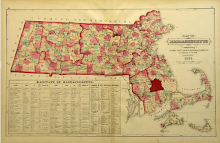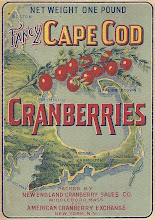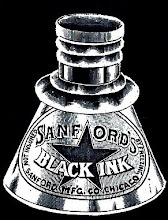
We've been having a good deal of wintry weather for our section of late, and skating by both sexes is a great fashion. On the 26th of last month, Arthur, Walton, and I skated about fifteen miles. We rode out to the south end of Long pond (Aponoquet), and leaving our horse at a farmer's barn, put on our skates, and went nearly in a straight line to the north end of said pond, up to the old herring weir of King Philip, where we were obliged to take off our skates, as the passage to Assawamset was not frozen. We stopped about an hour at the old [Sampson] tavern and had a good solid anti-slavery, and John Brown talk with some travellers....
After this scene we again assumed our skates from the Assawamset shore, near by, and skated down to the end of the East Quitticus pond, the extreme southern end of the ponds; thence crossing to West Quitticus, we skated around it, which with the return from the south end of the former pond to our crossing place, we estimated at something over 15 miles. Taking off our skates we took a path through the woods, and walking about a mile came out in some old fields near our starting point. We put on our skates at 10.30 o'clock A. M., and at 3 P. M. were eating dinner at the old farm-house of William A. Morton, near the south shore of Long Pond.
 I, as well as my boys, enjoyed the excursion very much. We saw our favorite pond under entirely new aspects, and visited many nooks that we had never before seen - sometimes under the boughs of the old cedars, draped in long clusters of moss, like bearded veterans, and anon farther out on the bosom of the lake, with broad and refreshing views of wild nature, taking the imagination back to the times of the Indians and early settlers of these parts - shooting by little islands and rocky islets, among them the one called "Lewis Island." which you thought would do for a residence. I got a fresh hold of life that day, and hope to repeat the pleasure before winter closes his reign. I found myself not only not exhausted, as I had expected, but unusually fresh and cheerful on my arrival home about 5 P. M. The boys stood it equally well. So my friend we shall not allow you all the glory of the skating field, but must place our Aponoquet, Assawamset and Quitticas-et, in the skating account with your own beloved Musketaquid [Concord River] exploits....
I, as well as my boys, enjoyed the excursion very much. We saw our favorite pond under entirely new aspects, and visited many nooks that we had never before seen - sometimes under the boughs of the old cedars, draped in long clusters of moss, like bearded veterans, and anon farther out on the bosom of the lake, with broad and refreshing views of wild nature, taking the imagination back to the times of the Indians and early settlers of these parts - shooting by little islands and rocky islets, among them the one called "Lewis Island." which you thought would do for a residence. I got a fresh hold of life that day, and hope to repeat the pleasure before winter closes his reign. I found myself not only not exhausted, as I had expected, but unusually fresh and cheerful on my arrival home about 5 P. M. The boys stood it equally well. So my friend we shall not allow you all the glory of the skating field, but must place our Aponoquet, Assawamset and Quitticas-et, in the skating account with your own beloved Musketaquid [Concord River] exploits....I expect to be in Boston at the annual meeting of the Mass. A. S. Society, near at hand, and hope to see you there, and if agreeable should like to have you return home with me, when, D. V., we may try our skates on the Middleborough ponds.
We all spoke of you and wished you were with us on our late excursion there.
Illustrations:
Ricketson, Anna and Walter Ricketson, eds. Daniel Ricketson and His Friends: Letters, Poems, Sketches, Etc. Boston: Houghton, Mifflin and Company, 1902, pp. 101-03























+of+Smoky+Mountains+018.jpg)